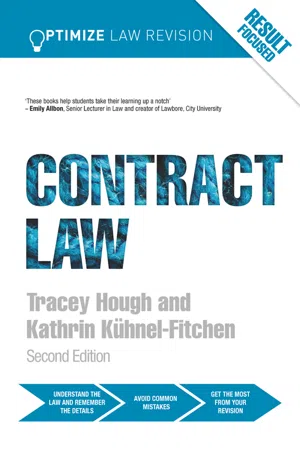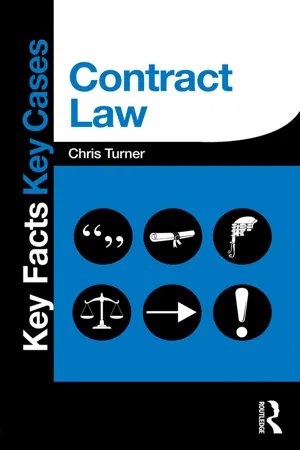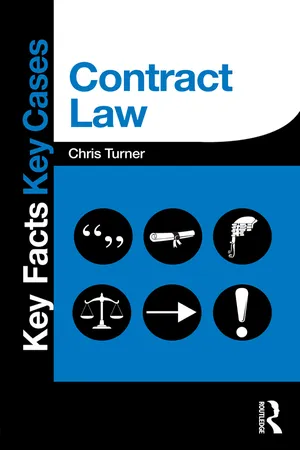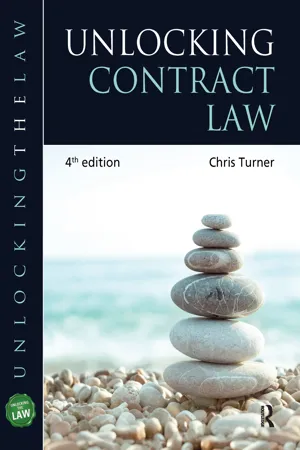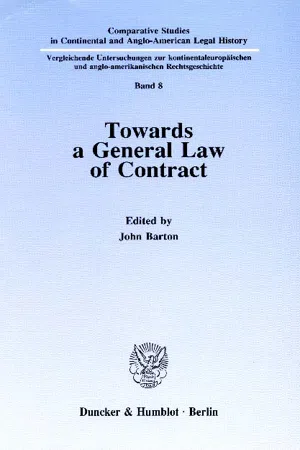Law
Consideration
Consideration refers to something of value exchanged between parties in a contract. It can be a promise, an act, or a forbearance, and is essential for a contract to be legally binding. Both parties must provide consideration for the contract to be enforceable, and it distinguishes a contract from a gift or a one-sided promise.
Written by Perlego with AI-assistance
Related key terms
1 of 5
11 Key excerpts on "Consideration"
- eBook - ePub
- John Adriaanse(Author)
- 2017(Publication Date)
- Bloomsbury Visual Arts(Publisher)
ConsiderationConsideration in construction contracts may appear at first an unlikely topic to require detailed discussion. After all, such contracts, whether they are made between commercial companies or between a householder and a builder, usually involve the outlay of significant sums of money. This would suggest that Consideration and the intention to create legal relations are always likely to be present. This perception is not entirely accurate, however. The doctrine of Consideration is of major importance in construction contracts. This is the inevitable consequence of a number of factors likely to be present, such as the length of the contractual chain stretching beyond the parties to their subcontractors and suppliers. In addition, the system of competitive bidding means that one party may well underprice the cost of the work, or the price of the work escalates beyond its control, thus raising the possibility that one party may wish to renegotiate the agreement. Such contracts are often made for the benefit of third parties, and thus it is inevitable that the rights of third parties will be involved at some stage.Lord Dunedin approved, in Dunlop Pneumatic Tyre Co Ltd v. Selfridges and Co Ltd [1915] AC 847, the definition provided by Pollock (1936, p. 133). Consideration is ‘an act of forbearance of the one party, or the promise thereof, is the price for which the promise of the other is bought, and the promise thus given for value is enforceable’. Chitty considers that the doctrine is there to provide legal limits on the enforceability of agreements, even when they are meant to be legally binding. Such a valid agreement can only be vitiated by mistake, misrepresentation, duress or illegality (Beale, 1999, p. 167).In English law, a promise is not as a general rule binding as a contract unless (a) it is made under seal or (b) it is supported by Consideration. In the context of construction, Consideration really means price - eBook - PDF
- Richard Mann, Barry Roberts(Authors)
- 2019(Publication Date)
- Cengage Learning EMEA(Publisher)
Consideration is the inducement to make a promise enforceable. The doctrine of consider- ation ensures that promises are enforced only in cases in which the parties have exchanged something of value in the eye of the law. Gratuitous (gift) promises—those made without Consideration—are not legally enforceable, except under certain circumstances, which are discussed later in the chapter. Consideration, or that which is exchanged for a prom- ise, is present only when the parties intend an exchange. The Consideration exchanged for the promise may be an act, a forbearance to act, or a promise to do either of these. Thus, there are two basic elements to Consideration: 239 Chapter 12 Consideration A’s promise to pay B $5,000 is binding because it is supported by Consideration; B, the promisee (offeree), has incurred a legal detriment by refraining from bring- ing suit, which he was under no prior legal obligation to refrain from doing. A, the promisor (offeror), has received a legal benefit because she had no prior legal right to B’s forbearance from bringing suit. Bilateral Contracts [12-1c] In a bilateral contract, there is an exchange of promises. Thus, each party is both a promisor and a promisee. For example, if A (the offeror) promises (offers) to purchase an automobile from B for $20,000 and B (the offeree) promises to sell the automobile to A for $20,000 (accepts the offer), the following relationship exists: Unilateral Contracts [12-1b] In a unilateral contract, a promise is exchanged for a completed act or a forbearance to act. Because only one promise exists, only one party, the offeror, makes a prom- ise and is therefore the promisor while the other party, the offeree, is the person receiving the promise and, thus, is the promisee. For example, A promises to pay B $2,000 if B paints A’s house. - eBook - ePub
- Keith Owens(Author)
- 2013(Publication Date)
- Routledge-Cavendish(Publisher)
Incidentally, it is a common misconception that a contract cannot be enforced unless one party has actually carried out at least part of his or her promised Consideration, for example, has given a deposit to the other party as part of the agreed purchase price. This is not correct. Provided there has been an exchange of promises whereby each party will provide something of value, each promise is enforceable in the sense that if one party refuses to perform his or her part of the bargain the other may sue for damages.DEFINITION OF Consideration
The two most commonly quoted definitions of Consideration are:(a) a valuable Consideration…may consist either in some right, interest, profit or benefit accruing to one party, or some forbearance, detriment, loss or responsibility given, suffered or undertaken by the other;Currie v Misa (1875)The main criticism of this definition is that it fails to make it clear that the promisee (that is, the person to whom the promise has been made and who is trying to enforce it) does not need to have actually given the benefit, etc, or suffered the detriment, etc, for him to have given Consideration. It is sufficient if the promisee has promised to give benefit or suffer detriment.(b) an act or forbearance of one party or the promise thereof, is the price for which the promise of the other is bought, and the promise thus given for value is enforceable. (Dunlop v Selfridge (1915), Lord Dunedin (quoting Pollock, Principles of Contract, - eBook - PDF
- Kathrin Kuhnel-Fitchen, Tracey Hough(Authors)
- 2017(Publication Date)
- Routledge(Publisher)
The promisor need not receive any tangible part, so a promisee made by the offeror to pay an over-weight associate a sum of money upon losing a specified amount of weight would be enforceable. Put simply, Consideration is what one party is giving or promising, in exchange for what is being given or promised by the other party to the contact. The best-known definition originates from Currie v Misa (1875) LR 10 Ex 153: ‘a valuable Consideration, in the sense of the law, may consist either in some right, interest, profit or benefit accruing to the one party or some forbearance, detriment, loss or responsibility, given, suffered or undertaken by the other.’ Lush J Currie v Misa (1875) Example: If Jayne sells her iPad to Ellie for £240, Ellie will receive the benefit of the iPad and her detriment will be the surrender of £240 of her cash to Jayne. There are two types of Consideration: An agreement to carry out a future act. Example: Jane promises to deliver a turkey to James on Christmas Eve. Payment on delivery. Where one party has carried out their side of the bargain. The other party has not yet, hence their Consideration is executory. Executed Consideration Executory Consideration Example: David pays Roberto £150 to perform a magic show at his son’s birthday party next Saturday. - eBook - ePub
- Chris Turner(Author)
- 2013(Publication Date)
- Routledge(Publisher)
Executory Consideration is where a promise to perform under the contract is given in return for a similar promise by the other party (e.g. goods ordered in return for a promise to pay the set price).3Executed Consideration is Consideration that is already given (e.g. money claimed under a reward).4So the difference between the two is often seen as the difference between bilateral and unilateral agreements.3.4 The rules of Consideration3.4.1 Consideration need not be adequate1The law of contract regulates the making of bargains. 2As freedom of contract is vital, the law is not concerned with whether a party has made a good bargain or a bad one. 3Adequacy is given its normal meaning – the contract is enforceable even if the price does not match the value of what is being gained under the agreement (Thomas v Thomas (1842)).3.4.2 Consideration must be sufficient1In this context sufficiency is given a precise legal meaning. 2Consideration offered is therefore ‘sufficient’ provided that: •it is real (White v Bluett (1853));•it is tangible (Ward v Byham (1956));•it has some discernible value (Chappel v Nestlé (1960)); and•economic value is measured against benefit gained (Edmonds v Lawson (2000), on payment of trainee barristers during pupillage).3It is arguable that judges find Consideration exists whenever they wish to enforce a particular agreement, regardless of the difficulties involved (Alliance Bank v Broom - No longer available |Learn more
- (Author)
- 2014(Publication Date)
- College Publishing House(Publisher)
____________________ WORLD TECHNOLOGIES ____________________ Chapter- 6 Consideration and Breach of Contract Consideration Consideration is the concept of legal value in connection with contracts. It is anything of value promised to another when making a contract. It can take the form of money, physical objects, services, promised actions, abstinence from a future action and much more. Under the notion of pre-existing duties, if either the promisor or the promisee already had a legal obligation to render such payment, it cannot be seen as Consideration in the legal sense. In common law it is a prerequisite that both parties offer some Consideration before a contract can be thought of as binding. However, even if a court decides there is no contract, there might be a possible recovery under Quantum meruit (sometimes referred to as a Quasi-contract) or promissory estoppel. Basic examples of Consideration If A signs a contract to buy a car from B for $5,000, A's Consideration is the $5,000, and B's Consideration is the car. Additionally, if A signs a contract with B such that A will paint B's house for $500, A's Consideration is the service of painting B's house, and B's Consideration is $500 paid to A. Further, if A signs a contract with B such that A will not repaint his own house in any other color than white, and B will pay A $500 per year to keep this deal up, there is also Consideration. Although A did not promise to affirmatively do anything, A did promise not to do something that he was allowed to do, and so A did pass Consideration. A's Consideration to B is the forbearance in painting his own house in a color other than white, and B's Consideration to A is $500 per year. ____________________ WORLD TECHNOLOGIES ____________________ Conversely, if A signs a contract to buy a car from B for $0, B's Consideration is still the car, but A is giving no Consideration, and so there is no valid contract. - eBook - PDF
- Chris Turner(Author)
- 2013(Publication Date)
- Routledge(Publisher)
Z 3.1 The nature and purpose of Consideration 1 Contract law concerns enforcement of promises based on mutual agreement. 2 In the early forms of contract law (debt, detinue, covenant) proof that a binding agreement existed was easily found in the form of the agreement (i.e. was only binding if under seal). 3 Enforcing informal agreements developed in the sixteenth century with the law of assumpsit: O the law would still not enforce merely gratuitous promises; O so the law had to develop an element that could distinguish between a proper contractual agreement that would be enforced, and some- thing less that would not. 4 This was the origin of the element of Consideration: a) Proof was required that the party seeking to enforce the contract was in fact a party to a mutual agreement by contributing something in return for the promise of the other party. b) This was the quid pro quo – one thing in return for another. c) In the sixteenth and seventeenth centuries, the courts asked for evidence of the existence of this extra element before they would acknowledge the existence of the agreement in law. d) Defining Consideration was and remains a problem. 3 Formation of a contract: Consideration and intention Defining Consideration 29 Z 3.2 Defining Consideration 1 Originally no single definition could be found. 2 Often the view taken was that Consideration was no more than the reason why the promise should be enforced in the case. 3 It was first seen as a rule of evidence, and later as a moral obligation, neither of which makes Consideration an essential in identifying a binding contract. 4 Nineteenth-century judges saw the essential difference between speciality agreements and ‘parol’ agreements ( Eastwood v Kenyon). Definitions • Benefit/detriment (Currie v Misa). • The promise of the one is the price for which the promise of the other is bought (Dunlop V Selfridge). - eBook - ePub
- Chris Turner(Author)
- 2014(Publication Date)
- Routledge(Publisher)
quid pro quo, the proof that a bargain in fact existed, and if no Consideration could be found then the agreement could not be enforced. The exception is an agreement made by deed.Initially, Consideration was an essential procedural element, but was ill defined because it could involve almost anything that showed some movement of benefit and detriment. This is inevitably why there was no real attempt at clear definition before the nineteenth century and why it remains a problematic area even now.3.1.2 Defining ‘Consideration’Originally, it proved impossible to give a simple, single definition of ‘Consideration’, and the pragmatic view was often taken that it was no more than the reason why the promise should be binding in law. Often in any case it was taken as being no more than a rule of evidence.Many nineteenth-century cases looked for definitions based on benefit gained and detriment suffered. So, for instance, Consideration was variously defined as:‘loss or inconvenience suffered by one party at the request of the other’ – Bunn v Guy (1803) 4 East 190‘some detriment to the plaintiff or some benefit to the defendant’ – Thomas v Thomas [1842] 2 QB 851.A simple, early way of defining Consideration came in Currie v Misa (1875) 1 App Cas 554 where it was described in terms of benefit and detriment: ‘some right, interest, profit or benefit accruing to one party, or some forbearance, detriment, loss or responsibility given, suffered or undertaken by the other’. So if I contract with you for the sale and purchase of my Unlocking Contract Law textbook for £15, I am gaining the benefit of the £15 but I have the detriment of giving up the book. For you, it is the other way round: you gain the book and give up the money.A more sophisticated definition was later provided in Dunlop v Selfridge [1915] AC 847. The case involved issues of both absence of Consideration and lack of privity of contract by the party seeking to enforce the contractual provisions. Here, the House of Lords approved Sir Frederick Pollock’s definition contained in his Principles of Contract - eBook - PDF
- (Author)
- 2013(Publication Date)
- The Floating Press(Publisher)
Chapter II -Contracts—Consideration and Enforceability * Consideration MAY BE ANOTHER PROMISE OR AN ACT.—The second great requisite in the formation of simple contracts is Consideration. A price must be paid for a promise in order to make it binding. The price paid may be another promise, in which case the contract is bilateral, or the price paid may be some act actually done or performed, in which case the contract is unilateral. ADEQUACY OF Consideration IMMATERIAL.—Not any act, or the promise of any act, is sufficient Consideration, as will be seen. Nevertheless, in general the law does not attempt to gauge the adequacy of the Consideration; that is, parties may make such bargains as they wish as far as the price is concerned. A may say that he will sell his horse, which is worth $300, for $100, or for a promise to pay $100. That will be a perfectly good contract, if accepted, in spite of the fact that the promised horse is worth more than the promised price. Such difference in the value of the promise and the value of the price may go to a great extreme. The horse may be a thousand-dollar animal, and the price promised only $100, but when you wish to push the case to an extreme you are likely to get into this difficulty: Did the parties really mean to make a bargain? If what they were doing was arranging for a gift of the horse and putting up some little alleged Consideration 47 as a blind, that will not do; but any exchange the parties really in good faith bargain for, with certain exceptions hereafter stated, is sufficient. A SMALLER SUM OF MONEY IS NOT SUFFICIENT Consideration FOR THE PROMISE SIMULTANEOUSLY TO PAY OR DISCHARGE A LARGER LIQUIDATED SUM.—This is the principal exception, that in contracts or promises relating to a fixed sum of money, the Consideration cannot be the simultaneous payment or discharge of a smaller sum of money on the other side. - eBook - PDF
- John Barton(Author)
- 2013(Publication Date)
- Duncker & Humblot(Publisher)
The third form, an existing duty, whilst regarded as Consideration as a matter of language, was no more than this; it was parasitic upon the concept of Consideration exemplified by benefit and detriment. As a matter of contractual theory, it had nothing to do with the reason why liability was imposed on the promisor: he was liable already, independent of the promise. Reciprocity and Value The essence of the idea of Consideration was that it should be something given (loosely) in exchange for the promise. From this it followed almost inevitably that the Consideration had to be of some real value. In principle no question would be raised about the relative value of the Consideration and the promise; so long as some Consideration had been given, no matter how small it was, the promise would be actionable; 27 examples were found, for instance, of the plaintiff going out of his way to make an oath, 28 or producing a deed for the defendant to examine. 29 At times the courts were unwilling to take this principle to its logical conclusion: in Lord Mordant's Case, 3{ ) for example, the defendant had promised to pay £ 100 in Consideration that Lord Mordant 2 6 The only problem was that on the face of it it constituted past Consideration; but this objection was always avoided: see below. 27 Howell v. Trivanian (1588), per Drew in argument; Sturleyn v. Albany (1589); Knight v. Rushworth (1596); the rule is found very early, being mentioned in the con-text of debt by Rastell, Expositiones Terminorum, sub verb Contract, cf Anon (1582) B. L. MS Add. 25197 f. 13v, where the Common Pleas refused to treat a contract as usurious even though the price sued for was three times a reasonable one. The only statement to the contrary is found in Harford v. Gardiner (1589): Consideration of one penny is not sufficient to raise a promise to pay a large sum, such as £ 100. (L. I. MS Hill 123b f. 85). 28 Knight v. Rushworth (1596). 29 Fooly v. Preston (1587). 30 1602. - eBook - PDF
- Jason W Neyers, Richard Bronaugh, Stephen G.A. Pitel(Authors)
- 2009(Publication Date)
- Hart Publishing(Publisher)
54 Stephen Waddams so that if a man will oblige himself under the solemnitys of law whereby his contract appears to be seriously intended, it shall ever be obligatory and the Consideration shall be intended . . . but if the contract be verball only it binds in respect of the Consideration, otherwise a man might be drawn into an obligation without any real intention by random words, ludicrous expressions, and from hence there would be a manifest inlet to perjury because nothing were more easy than to turn the kindness of expressions into the obligation of a real promise. 11 ‘Consideration’ is a conveniently flexible word, embracing three very different ideas: deliberation, reason for making the contract, and reason for enforcing it. Gilbert’s reference to perjury adds a fourth idea: the requirement of Consideration tends to supply reliable evidence that the promise in question has actually been made. This last idea was taken up by Lord Mansfield in Pillans and Rose v Van Mierop and Hopkins . 12 In that case a promise had been given in a commercial context by the defendant, in a signed writing, to guarantee repayment of money already advanced by the plaintiff. Lord Mansfield favoured enforcement. He said: I take it, that the ancient notion about the want of Consideration was for the sake of evidence only; for when it is reduced into writing, as in covenants, specialties, bonds &c there was no objection to the want of Consideration. And the Statute of Frauds proceeded upon the same principle. In commercial cases amongst merchants, the want of Consideration is not an objection. 13 Wilmot J thought that the requirement of Consideration originally ‘was intended as a guard against rash inconsiderate declarations’. 14 This reason also would have been sufficient to justify enforcement in the particular case, but he and the other judges managed, with some difficulty, to find Consideration (in the sense of value exchanged).
Index pages curate the most relevant extracts from our library of academic textbooks. They’ve been created using an in-house natural language model (NLM), each adding context and meaning to key research topics.



